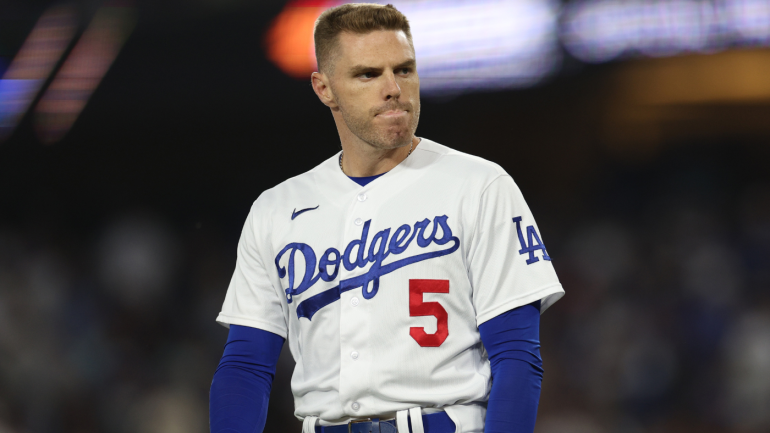
The reality of the sports world is that any time there's a new postseason format, regardless of the sport, there's bound to be consternation. There's always going to be a segment of the particular sport's fan base resistant to change and once the games start being played, a few upsets put everyone on high alert about the so-called "trends" in the new system.
Almost immediately, there are cries for change.
Sure enough, a good portion the baseball world seems to have lost its mind due to the Braves being the best team in baseball through 162 games and then losing one playoff game at home. Maybe the Braves' comeback win in Game 2 against the Phillies will quiet the most vocal complainers out there, but it's still happened far too much.
We're already being treated to in-game discussions about the format ("rest vs. rust" appears to be the preferred terminology when taking part in the discourse; that is, "they aren't getting rest, they are getting rusty!"), columns about why the format might actually be bad for the teams that get to bypass a round and, good grief, the social media discourse is off the hook.
The argument for change goes that too many of the "best teams" are "losing right away" and that is must be due to the Wild Card Series teams being in a groove and the teams getting byes are completely going cold due to having too many days off.
Can we just take a breath, please, everyone?
No, I guess not. That just isn't possible in the 24/7 social media era. Every single little detail requires attached hot takes and an additional requirement is that we must believe everyone who might have a differing opinion must be ignorant to the actual facts.
First off, the All-Star break is four days. The teams with byes in this playoff format get five days off. I guess we need to do away with that midseason break, too, lest it be unfair to any player who is having a good season. Those four days off could ruin him.
Sarcasm aside, the teams with byes get five days after a grueling regular season to get some rest, line up their starting pitching and don't have to win two out of three against a quality team to advance to the LDS. That's a huge advantage, in my opinion. For the people saying it's actually a disadvantage, you better have a lot of proof.
This is the second year with this playoff format. Baseball is a game where we use large samples before making determinations, right? Here's what everyone is reacting to.
What happened last year?
The 111-win Dodgers lost their NLDS to the 89-win Padres. This was after the Padres needed three games to get past the Mets in New York while the Dodgers sat around resting up. Or rusting.
The 101-win Braves lost their NLDS to the 87-win Phillies. The Phillies won their Wild Card Series in two games, but the Braves didn't have to play any, sitting around resting. Or rusting.
Sounds pretty convincing, right?
We better go look at the AL side.
The Astros, after their rusty rest period, swept the Mariners in three games. The Yankees prevailed over the Guardians, too. Those were the AL bye teams, the winners.
So the four teams that had byes went 2-2 in the divisional series.
It should also be noted that the Dodgers won Game 1 in their series.
That means that last season the teams that were supposedly rusty heading into the divisional series went 3-1 in Game 1 and 2-2 in the series.
If this is an argument that the bye is bad for the 1-2 seeds, it's not a compelling one.
Also, the Houston Astros won the 2022 World Series. They were the top AL seed and at 106-56 with a +219 run differential, it was one of the best 25ish regular-season teams in MLB history (there have been exactly 25 teams in MLB history to win at least 106 games in a season).
If the argument is that the new format makes it too easy for great teams to lose and lukewarm teams to win it all, our first season blew that argument out of the water with its very-deserving champion.
2023 results, so far
We haven't even let the divisional round finish yet, so I can't even use full-series data yet. We're already in overdrive with the argument, though, so I guess we have to dive in.
We do know the top-seeded Orioles are 0-2 while the Astros won Game 1 and lost Game 2. You'd have a hard time convincing me that a team winning Game 1 is still somehow rusty enough to be at a disadvantage the rest of the series (NOTE: This is why I'd throw out last year's Dodgers as part of the argument; they won Game 1, so they weren't rusty).
The Dodgers were embarrassed in Game 1 by the D-backs. The Braves forgot how to score runs for Game 1 against the Phillies.
Those two series really seemed to be the breaking point that sent everyone over the edge.
And yet, the Braves won Game 2 with a furious, late-inning comeback. That series is now tied, 1-1.
The Dodgers and Orioles are combined to be 0-4 while the other two series are 1-1, meaning the teams with the byes are 2-6 so far. I guess that's the evidence that this format is unfair to the bye teams. It does sound jarring, but the bye teams were 5-3 through Games 1 and 2 last season. Is this really enough to declare a change is needed?
Wild-card wrinkle
Let's talk about the Wild Card Series, though.
If the argument is that the best teams are going cold and that's why the lesser seeds are winning games, shouldn't we be using the small-sample data of the Wild Card Series to prove that's how it is going down?
For example, the Rays won 99 games this season while the Rangers won 90. If the reason the lesser teams are winning some games in the divisional round, shouldn't the better teams be dominating in the Wild Card Series?
The Rangers went into Tampa Bay and swept the Rays in two games. Both teams had the same amount of rest. There wasn't any "rhythm" imbalance at all. And yet, the Rays were embarrassed for two games, completely blown out of their own building. Had this happened with the Rays being the No. 1 seed and waiting on the wild-card Rangers to show up after five days off, this series 100% would've been used as evidence that the higher seeds are at a disadvantage for those people making the "rust vs. rest" argument.
But the Rays just played horribly and the Rangers played well. It happens.
Ditto for the Diamondbacks-Brewers series, except the Brewers sprung out to a lead in both games before the D-backs stormed back to win. The Brewers were eight games better in the regular season and were playing at home. How else could we possibly explain the road team storming back in both games unless they were in a groove while the Brewers were rusty? Right? But, again, each team had the same amount of time off before the series.
The D-backs just outplayed the Brewers.
The funny thing is, if we went back to the 2022 Wild Card Series, the road teams prevailed in three of the four series.
In two years, we've seen the road team win five of the eight Wild Card Series with four of those road winners being two-game sweeps.
In fact, road teams in the Wild Card Series in Game 1 of this format are 5-3. Road teams in Game 1 of the LDS round in this format are 4-4. If we're going to point to the Game 1 records of the bye teams through eight games in this new format as a trend, we also have to claim that there's a trend toward the road team in the Wild Card Series, too, right? But there's no "rest vs. rust" element, so that argument doesn't have quite the same luster.
Why are so many people missing the easiest and most important point of all?
Small-sample randomness is part of baseball
I love how the Braves lost one game and it caused so many people to collectively lose their minds. Did you know they lost two of three to the A's, who were historically bad this season? They lost two of three at home to a 101-loss White Sox team. Should we change the format of the regular season since those results didn't make sense?
The Braves were 8-5 against the Phillies this season, but did you know that on Sept. 18, the first game of a series between the two teams, the Phillies won 7-1. Neither team was coming off a day off. You see, sometimes one team just plays better than the other and it doesn't have anything to do with rest/rust.
We could go through this with every single team, every single season.
Sifting through past postseasons
In fact, since the new format is the culprit, let's take a look at some of the past seasons where it wasn't so unfair to the best teams.
- In 2021, the Braves had the worst record among playoff teams and won the World Series. That was the old format. I guess it was OK then, since it benefitted the Braves to have the 107-win Giants and 106-win Dodgers squaring off in the NLDS.
- In 2019, neither the 106-win Dodgers nor 97-win Braves made the NLCS. It was the 91-win Cardinals against the 93-win Nationals.
So I guess it has been worse for the best teams recently, regardless of format, right?
- The 2018 Red Sox had the best record in baseball and won the World Series.
- In 2017, two of the three 100-win teams squared off in the World Series.
- In 2016, the Cubs had the best record in baseball and won the World Series.
Sometimes the format seems unfair based on weird circumstance.
- In 2015, the three best records in baseball came from the same division: The NL Central. Two of the three teams faced off in the Wild Card Game and the winner of that faced the other. There was no chance for more than one to even advance to the league championship series.
On an annual basis, the playoffs are going to yield funky results.
- Since 1995, the team with the best record has won the World Series just seven times.
The only way to truly ensure the two best teams face each other in the World Series is to eliminate the playoffs. There are people out there who wish it would be the old, old, old format, where the team with the best record in the American League won the pennant and the team with the best record in the National League won the pennant. Then they'd play each other for seven games and we'd have a World Series champion. There's principle in this argument. I still love the playoffs too much to part with them, but I admire those people a lot more than the ones who kick and scream about the playoff format every year just because it isn't conforming to what they think the results should be.
As long as there are playoffs, there will be upsets and funky-looking results. That's what happens when a large-sample game gets played in small-sample series. No matter what tweaks are made, this will always be the case. We should stop being reactive and trying to fix everything and instead just embrace the madness.






















